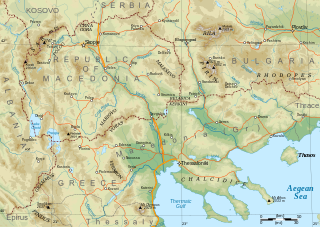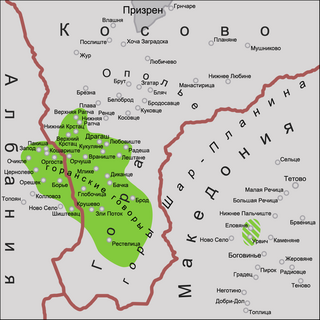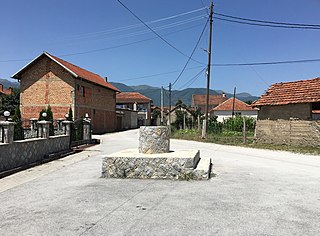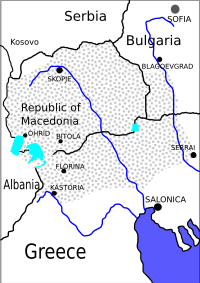
Macedonian is an Eastern South Slavic language. It is part of the Indo-European language family, and is one of the Slavic languages, which are part of a larger Balto-Slavic branch. Spoken as a first language by around two million people, it serves as the official language of North Macedonia. Most speakers can be found in the country and its diaspora, with a smaller number of speakers throughout the transnational region of Macedonia. Macedonian is also a recognized minority language in parts of Albania, Bosnia and Herzegovina, Romania, and Serbia and it is spoken by emigrant communities predominantly in Australia, Canada and the United States.

Macedonia is a geographical and historical region of the Balkan Peninsula in Southeast Europe. Its boundaries have changed considerably over time; however, it came to be defined as the modern geographical region by the mid-19th century. Today the region is considered to include parts of six Balkan countries: all of North Macedonia, large parts of Greece and Bulgaria, and smaller parts of Albania, Serbia, and Kosovo. It covers approximately 67,000 square kilometres (25,869 sq mi) and has a population of around five million. Greek Macedonia comprises about half of Macedonia's area and population.

The Gorani or Goranci, are a Slavic Muslim ethnic group inhabiting the Gora region—the triangle between Kosovo, Albania, and North Macedonia. They number an estimated 60,000 people, and speak a transitional South Slavic dialect, called Goranski. The vast majority of the Gorani people adhere to Sunni Islam.

The Aromanians are an ethnic group native to the southern Balkans who speak Aromanian, an Eastern Romance language. They traditionally live in central and southern Albania, south-western Bulgaria, northern and central Greece and North Macedonia, and can currently be found in central and southern Albania, south-western Bulgaria, south-western and eastern North Macedonia, northern and central Greece, southern Serbia and south-eastern Romania. An Aromanian diaspora living outside these places also exists. The Aromanians are known by several other names, such as "Vlachs" or "Macedo-Romanians".

Macedonians are a nation and a South Slavic ethnic group native to the region of Macedonia in Southeast Europe. They speak Macedonian, a South Slavic language. The large majority of Macedonians identify as Eastern Orthodox Christians, who share a cultural and historical "Orthodox Byzantine–Slavic heritage" with their neighbours. About two-thirds of all ethnic Macedonians live in North Macedonia and there are also communities in a number of other countries.

The region of Macedonia is known to have been inhabited since Paleolithic times.

Torlakian, or Torlak, is a group of transitional South Slavic dialects of southeastern Serbia, Kosovo, northeastern North Macedonia, and northwestern Bulgaria. Torlakian, together with Bulgarian and Macedonian, falls into the Balkan Slavic linguistic area, which is part of the broader Balkan sprachbund. According to UNESCO's list of endangered languages, Torlakian is vulnerable.

The existence and distinctiveness of the Macedonian language is disputed in Bulgaria and the name of the language was disputed by Greece. By signing the Prespa Agreement, Greece accepted the name "Macedonian language" in reference to the official language of North Macedonia.
The history of the Macedonian language refers to the developmental periods of current-day Macedonian, an Eastern South Slavic language spoken on the territory of North Macedonia. The Macedonian language developed during the Middle Ages from the Old Church Slavonic, the common language spoken by Slavic people.
Minorities in Greece are small in size compared to Balkan regional standards, and the country is largely ethnically homogeneous. This is mainly due to the population exchanges between Greece and neighboring Turkey and Bulgaria, which removed most Muslims and those Christian Slavs who did not identify as Greeks from Greek territory. The treaty also provided for the resettlement of ethnic Greeks from those countries, later to be followed by refugees. There is no official information for the size of the ethnic, linguistic and religious minorities because asking the population questions pertaining to the topic have been abolished since 1951.

The name Macedonia is used in a number of competing or overlapping meanings to describe geographical, political and historical areas, languages and peoples in a part of south-eastern Europe. It has been a major source of political controversy since the early 20th century. The situation is complicated because different ethnic groups use different terminology for the same entity, or the same terminology for different entities, with different political connotations.

The official language of Greece is Greek, spoken by 99% of the population. In addition, a number of non-official, minority languages and some Greek dialects are spoken as well. The most common foreign languages learned by Greeks are English, German, French and Italian.

The Gorani or Goranski, also Našinski language, is the variety of South Slavic spoken by the Gorani people in the border area between Kosovo, North Macedonia, and Albania. It is part of the Torlakian dialect group, which is transitional between Eastern and Western South Slavic languages.

The official language of North Macedonia is Macedonian, while Albanian has co-official status. Macedonian is spoken by roughly two-thirds of the population natively, and as a second language by much of the rest of the population. Albanian is the largest minority language. There are a further five national minority languages: Turkish, Romani, Serbian, Bosnian, and Aromanian. The Macedonian Sign Language is the country's official sign language.

The history of Macedonians has been shaped by population shifts and political developments in the southern Balkans, especially within the region of Macedonia. The ideas of separate Macedonian identity grew in significance after the First World War, both in Vardar and among the left-leaning diaspora in Bulgaria, and were endorsed by the Comintern. During the Second World War, these ideas were supported by the Communist Partisans, but the decisive point in the ethnogenesis of these South Slavic people was the creation of the Socialist Republic of Macedonia after World War II, as a new state in the framework of the Socialist Federal Republic of Yugoslavia.

The Macedonians in Albania are an officially recognized ethnic minority. According to the 2011 census, 5,512 ethnic Macedonians live in Albania. In the 1989 census, 4,697 people had declared themselves Macedonian.

The Bulgarians in Albania live mostly in the areas of Mala Prespa, Gollobordë and Gora. According to the Bulgarian State Agency for Bulgarians Abroad, 40,000 to 50,000 persons of Bulgarian origin are living in Albania. Ethnic identity can be fluid among the Albania's Slavophonic population, who might identify as Albanian, Bulgarian or Macedonian, depending on the circumstances. Between 2001 and 2016, around 4,470 Albanian nationals applied for a Bulgarian citizenship and over 2,600 of them were granted one. The Bulgarian minority was recognized by the Albanian government in October 2017.
Slavic speakers are a minority population in the northern Greek region of Macedonia, who are mostly concentrated in certain parts of the peripheries of West and Central Macedonia, adjacent to the territory of the state of North Macedonia. Their dialects are called today "Slavic" in Greece, while generally they are considered Macedonian. Some members have formed their own emigrant communities in neighbouring countries, as well as further abroad.

The Macedonian diaspora consists of ethnic Macedonian emigrants and their descendants in countries such as Australia, Italy, the United Kingdom, Germany, New Zealand, Canada, the United States and others. A 1964 estimate put the number of Macedonian emigrants at over 580,000.

Dolna Belica is a village in the municipality of Struga, North Macedonia.



















